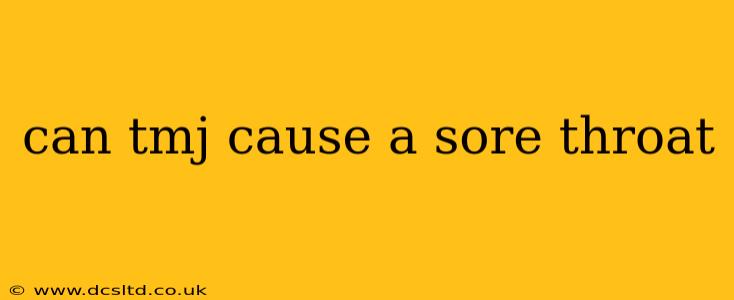Temporomandibular joint (TMJ) disorder is a common condition affecting the jaw joint and the muscles controlling chewing. While jaw pain and headaches are well-known symptoms, many sufferers also experience seemingly unrelated symptoms, leading to questions like, "Can TMJ cause a sore throat?" The answer is complex and often involves a connection rather than direct causation. Let's delve into the potential links and explore the reasons why a sore throat might accompany TMJ.
How Can TMJ Lead to Throat Pain?
TMJ doesn't directly cause a sore throat in the way a viral infection does. However, the intricate network of muscles and nerves in the head and neck means that problems in one area can easily impact others. The connection between TMJ and throat pain is often indirect and can manifest in several ways:
-
Muscle Tension and Referrals: The muscles involved in TMJ function are interconnected with those in the neck and throat. Chronic tension from TMJ dysfunction can spread to these surrounding muscles, leading to pain and stiffness in the throat. This is known as referred pain, where pain is felt in a location different from its source. Think of it like a ripple effect; the initial problem in the jaw joint creates tension that radiates outwards.
-
Postural Changes: TMJ issues can alter posture, causing the head to tilt or shift forward. This poor posture can strain the muscles in the neck and throat, contributing to soreness and discomfort.
-
Inflammation: TMJ disorder often involves inflammation of the jaw joint itself. This inflammation can sometimes spread to adjacent tissues, including those in the throat, causing irritation and pain.
What Other Symptoms Accompany TMJ?
It's crucial to understand that TMJ often presents with a constellation of symptoms, not just a sore throat. Recognizing these can help with accurate diagnosis. Common TMJ symptoms include:
- Jaw pain: This can range from mild discomfort to severe, sharp pain.
- Headaches: Often located in the temples or behind the eyes, these can be tension headaches or migraines.
- Earaches: Pain in the ear can be a significant symptom, often misdiagnosed as an ear infection.
- Clicking or popping in the jaw: This is a very common symptom, often noticeable when opening or closing the mouth.
- Limited jaw movement: Difficulty opening or closing the mouth widely.
- Facial pain: Pain can be felt in the cheeks, temples, or even the forehead.
- Neck pain: Stiffness and pain in the neck are common due to the interconnectedness of the muscles.
How is TMJ Diagnosed?
A dentist specializing in TMJ disorders or an oral surgeon is best equipped to diagnose TMJ. They'll typically conduct a thorough examination, including checking for jaw range of motion, listening for clicking sounds, and assessing muscle tenderness. Imaging techniques like X-rays or MRI scans may be used to rule out other issues.
Can other conditions cause both TMJ and throat pain?
Yes. Certain conditions can affect both the jaw and the throat, potentially leading to symptoms mimicking TMJ. These include:
- Dental issues: Problems like impacted wisdom teeth, bruxism (teeth grinding), or malocclusion (misaligned teeth) can contribute to both jaw and throat pain.
- Sinus infections: Inflammation and pressure from sinus infections can cause referred pain to the jaw and throat.
How is TMJ treated?
Treatment for TMJ varies depending on the severity of the symptoms. Options include:
- Lifestyle modifications: Improving posture, stress management techniques, and avoiding activities that aggravate the condition.
- Medications: Pain relievers, muscle relaxants, or anti-inflammatory drugs.
- Physical therapy: Exercises and stretches to strengthen jaw muscles and improve range of motion.
- Dental splints or appliances: These can help to realign the jaw and reduce pressure on the joint.
- Surgery: In rare cases, surgery may be necessary to correct significant jaw problems.
Disclaimer: This information is for educational purposes only and is not a substitute for professional medical advice. If you are experiencing TMJ symptoms or a sore throat, it's vital to consult a healthcare professional for proper diagnosis and treatment.
